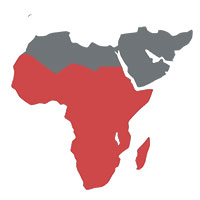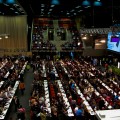Critically Important
admin | November 29, 2011.
Copenhagen and Cancun were far from successes, the Kyoto Protocol is nearing expiration – Durban needs to deliver. It is therefore no surprise that the focus of the international media is on what the negotiators from the main parties have to say. The voice of the youth is often not heard. Even though it should be – at this COP more than ever.
They sit in little circles on the floor in one of the conference rooms or outside, leaning against the wall. They are not wearing suits and ties; instead of the slow and complicated communication processes employed by the negotiators they are using hand signals, that to the inexperienced may seem confusing at first. Global youth organisations have come to Durban to change the traditions of the UN. Using alternative ways to get their message across does not, however, mean that they have anything less important to say. Far from it – since they do not have to stick to formal diplomatic palaver, they can say things as they are.
To express their message, they often come from the other side of the world. Like Katherine Tu, who has come to Durban all the way from Australia, LJ from Singapore or Megan van Buskirk and Ashley Geddis from Canada. “The youth has a large presence, and they are very passionate about what they are doing,” says van Buskirk. Tu agrees: “It is really great to see lots of people from all over the world, from the Global North, the Global South, people with different genders and ethnicities, representing different issues and trying to make their voices heard.” “It is really inspiring,” LJ adds.
Ahead of the opening of COP17 today, they had all gathered at Howard College in the hills above Durban to discuss their positions at the Conference of the Youth (COY). In different workshops and discussion groups, they established the different views on climate change and what ought to be done. “COY was a huge success, especially because of the establishment of a South African Youth Climate Coalition,” Tu recaps.
The foundation of this coalition in a country from the Global South is part of a trend very present at this COP in Durban: many youth from developing countries have joined the international youth climate movement. “Last year in Cancun, there were only few African youth delegates and this year there is a giant representation from Africa,” says Buskirk.
Jean Paul Brice Affana is one of those African representatives. He is from Cameroon and works as Focal Point for YOUNGO, a network of youth NGOs within the UNFCCC process. “The location of COP in South Africa allows a lot more people from Africa to participate,” he says. “It is great that they could all come here.”
While they all agree on the importance of a strong African presence, they also agree that the traditional media coverage of the youth’s work is sparse. Also within the United Nations itself this has become a matter of interest. “I don’t think the youth presence is acknowledge by the press, journalists are looking for ‘hard news’. What the youth are doing is more, what journalists would call, ‘soft news,'” says Sarah Marchildon, a consultant on youth related activities for the UNFCCC. “I would love to see more focus in the media on what the young people are doing.”
Marchildon believes that including the youth is critically important. “This conference has often become a bubble world, lacking the connection to the outside world. But you need the public. The youth are perfectly connected via social media. They are the ones building public pressure, which is crucial to achieve something.”
The traditional media has almost not recognised this importance. Maybe because they have simply not realised or because their increasingly tight budgets forces them to focus on the outcomes of the conference. Now, however, would be the time to realise this overwhelming presence. Never before have so many youth from countries that are most effected by climate change attended a UNFCCC COP. Never before have the discussions and viewpoints on the floor in the conference buildings been so mixed. At this crucial point of the climate change negotiations it would be more necessary than ever to include those who will have to bear the effects of climate change, when today’s negotiators will not be around tomorrow.












comment